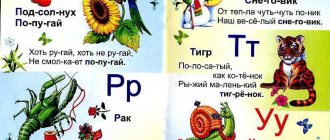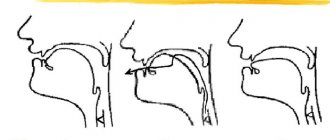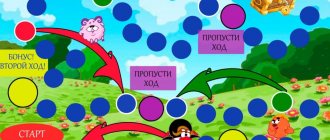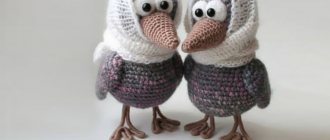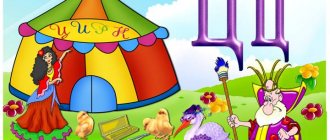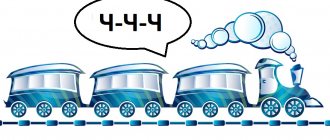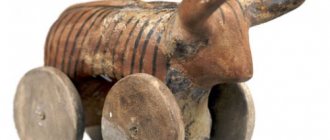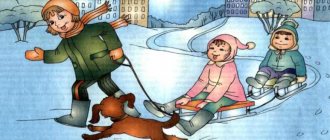Interesting facts about the letter B
The name of the letter “ve”, which is familiar to us, was not always like this. For example, earlier, and even now, in the Church and Old Slavonic alphabet, this letter is called “vedi” and “vede”, respectively. And the letter took its name from one of the forms of the verb “to know” or “to know.”
In the Roman alphabet B is “vita”, i.e. "life".
The Cyrillic form of the letter is borrowed from the Greek letter “beta”, which also had the shape of a three with a left column, only a little longer downwards.
In Russian, В is used to denote two sounds [в] and [в`].
[в] and [в`] are pronounced before voiced consonants and vowels (vera, in addition).
Before voiceless consonants, in the middle or at the end of a word, the letter is deafened and we hear and pronounce the sound indicated by its paired consonant F, i.e. [f] or [f`] (Tuesday - [ftornik], shop - [lavka], courtyards - [dvorof]).
Any foreigner who begins to study our great language wonders why the same letter B, being in different parts of the word, is pronounced differently and replacing the sound is simply unacceptable. For example, the surname “Vasiliev” begins and ends with the same letter, but must be pronounced differently - [vas'il'y'if].
And in many words this letter is not pronounced at all. It seems to dissolve among other consonants (feeling - [feeling]).
The letter B is present in the Ukrainian and Belarusian languages, but there it is not deafened, but sounds like a vowel sound [u] - “everything” - [truncated].
Lesson notes “Sound B”
Words ending with the syllable "na"
The syllable “NA”, according to the initial sound, belongs to the type - covered
(begins with a consonant), according to the final sound -
open
(ends with a vowel sound), according to the initial and final sound -
open
(is not both closed and closed).
Consisting of 2 syllables:
- wave
- war
- loach
- clay
- length
- dune
- wife
- zina
- ice floe
- moon
- Lena
- mine
- Nina
- a country
- secret
- price
- tire
- link
- maple
- elephant
- member
- Lina
- Lana
- blast furnace
- hay
- Tina
- drunk
- noisy
- guilt
- given
- grains
- wall
- gene
- Khan
- horseradish
- won
- Dina
- change
- plan
- urn
- forge
- aina
- wound
- millet
- full
- dog
- smart
- Rena
- Dvina
- string
- scene
- foam
Consisting of 3 syllables:
- Alina
- arena
- Arina
- Alyona
- angina
- epic
- depression
- vertex
- crow
- Galina
- Elena
- greedy
- woman
- Irina
- names
- basket
- painting
- liana
- car
- raspberries
- Maryana
- malvina
- lowland
- aspen
- Oksana
- Rowan
- homeland
- plain
- district
- silence
- Tatiana
- Ulyana
- fortune
- fauna
- Faina
- hut
- central
- width
- bristle
- Yasmina
- Janina
- Anton
- banana
- gasoline
- Berlin
- chatterbox
- swimming pool
- balcony
- warrior
- volcano
- Ivana
- clown
- jug
- trap
- lemon
- olive
- Milana
- penguin
- Pushkin
Consisting of 4 syllables:
- quiz
- Gagarin
- hygiene
- pea
- discipline
- pearl
- unfeigned
- awarded
- directed
- monkey
- web
- Ukraine
- owner
- scratch
- Juliana
- angelina
- grandma's
- citizen
- Mr.
- intimidated
- iguana
- bones
- quarantine
- million
- ocean
- plasticine
- postman
- restaurant
- region
- phone
- luff
- electron
- shark
- proscenium
- scared
- trampled
- lamb
- mutton
- protein
- valentine
- magnitude
- Yummy
- Levitan
- echelon
- Augustine
- outskirts
- upset
- engaged
- reviewed
- strewn
- sensitive
- businessman
- valid
- Karamzin
- trillion
- bastion
- Pakistan
- core
- veal
- pharaoh
Consisting of 5 syllables:
- Catherine
- Christian
- attraction
- airplane
- accordion
- epifauna
- evangelina
- widespread
- gibberish
- gas exchange
- hallelujah
- Azefovism
- bazaarism
- furnished
- turtle
- railcar
- Turkmenistan
- depicted
- spoiled
- microdistrict
- designated
- required
- used
- involved
- idiot
- avifauna
- cholesterol
- addressed to
- due to
- wormhole
- Bironovism
- heat exchange
- Asian
- range
- significant
- stunned
- fascinating
- rendered harmless
- Napoleon
- atamanism
- sentimental
- auction
- developed
- blocked
- tanker truck
- familiarized
- imitative
- spread out
- amazing
- aboriginal
- arrested
- armed
- car
- implemented
- fatherlessness
- released
- stunning
- muddle
- amazing
- car tires
Consisting of 6 syllables:
- disappointed
- confidential
- illustrated
- employed
- air exchange
- metro
- biomedicine
- carelessness
- paralyzed
- exchange of goods
- White Guard
- Arakcheevism
- organized
- self-discipline
- formulated
- interconnected
- concentrated
- worried
- equidistant
- tested
- landscaped
- implemented
- anti-Soviet
Consisting of 7 syllables:
- deactivated
- renovated
- registered
- interested
- opposed
Consisting of 8 syllables:
- aerial forest protection
- VCR
Poems about V
Poems are dedicated to different people and events. And we will dedicate today's poems to the letter we met today. Take the baton and come up with your own two- and quatrains. Send them through the comment form. And I will add them to our common collection of poems about V.
*** How good life is for her. In third place in the alphabet. We call it “ve”, and the Greeks call it “vita”.
*** The letter B sits on a branch and shouts from there to Svetka: I will live in your name both at night and during the day.
Sveta smiled and turned away from the letter. “Who the hell are you, naughty letter?”
“I’m not playing with you, I don’t know you. I’ll collect flowers in a bouquet, and who do you look like?”
The letter B is like the number three (3) - Look at it. Everyone knows - Lena, Vita O is the third letter in the alphabet.
Russian words ending with P
Reverse Russian dictionary (word endings with P) - Igor Garshin’s website
| Garshin.Ru |
| Lexicons |
[/td]
WriteHome > Zaliznyak's Reverse Dictionary > Words ending in P
Common Slavic roots of Russian: | | | | | E, E, Ѣ | | | | | | | | | | | | | U, Ѫ | | | | | | Yu, i | I, and
Original Russian words: | | | | | E, Yo | | | b, s, b | | |
Foreign borrowings in Russian: | | | | | | | | |
Trubachev's Proto-Slavic Lexical Fund: | | | | | | | | | | | | | | | |
| Russian dictionaries: | Bibliographies: | Etymological | Intelligent | Dialectal | Historical | Regulatory | Terms |
| Dictionaries on the site: | Fasm. | Tsyg. | Shan. | Sem. | Shap. | Shim. | Dahl | Krysin (in.sl.) Ozhegov | Arch. | Novg. | Psk. | SRNG | Academy | Lopatin | Tikhonov | Oil&Gas | Prombez | | GIS |
Words ending with: | | | | | | | | | | | | | | | | | | | | | | | | | | | | | |
Russian words ending with the letter P :
- cap
- handicap
- pickup
- graypaw
- Aesculapius
- clap
- synapse
- kandil-sinap
- arap
- scratch
- dac-scratch
- sharap
- drape
- speckled
- scribbled
- scrap
- ladder
- satrap
- storm ladder
- ladder
- saddle pad
- snore
- impudently
- snore
- glanders
- stage
- hap
- DAC
- katsap
- chicken
- sovdep
- rustle
- crypt
- cross-blind
- spank
- woodcock
- curlew
- Garnish
- scull
- buyrep
- crepe
- brace
- lanyard
- false rep
- nativity scene
- two-step
- flail
- hook
- trailer
- semitrailer
- cordon
- clutch
- release
- clothespin
- cleft
- hardening
- slander
- rivet
- slap
- lip slap
- chatter
- jeep
- skip
- polyp
- slip
- sob
- creak
- trippy
- wheeze
- vulture
- type
- subtype
- archetype
- stereotype
- genotype
- phenotype
- linotype
- monotype
- daguerreotype
- autotype
- prototype
- principle
- thorn
- crank
- pinch
- teletype
- volley
- pillar
- vamp
- stamp
- pace
- tromp
- estomp
- op
- hon.
- Ethiopian
- undermining
- coal miner
- digger
- salt digger
- digging
- trench
- miner
- digging
- osprey
- megascope
- epidiascope
- cinemascope
- excavation
- verascope
- litascope
- telescope
- radio telescope
- kinescope
- bishop
- archbishop
- episcope
- spinthariscope
- periscope
- polariscope
- strobe
- ovoscope
- esophagoscope
- laryngoscope
- kaleidoscope
- phonendoscope
- endoscope
- geoscope
- stereoscope
- helioscope
- ebullioscope
- alloscope
- oscilloscope
- dynamoscope
- anemoscope
- chromoscope
- thermoscope
- seismoscope
- ophthalmoscope
- filmoscope
- galvanoscope
- uranoscope
- diaphanoscope
- litakinoscope
- rhinoscope
- iconoscope
- chronoscope
- synchroscope
- phonoscope
- baroscope
- vibroscope
- hygroscope
- scleroscope
- gyroscope
- pyroscope
- microscope
- ultramicroscope
- horoscope
- phosphoroscope
- urethroscope
- electroscope
- spectroscope
- astroscope
- synchroscope
- chromatoscope
- stomatoscope
- statoscope
- kinetoscope
- stethoscope
- lactoscope
- proctoscope
- flaw detector
- pantoscope
- otoscope
- cystoscope
- nephoscope
- gallop
- escalope
- salop
- bug
- Cyclops
- redbug
- dunce
- serf
- oslop
- clap
- swat
- exhaust
- stenope
- button
- sheaf
- pop
- archpriest
- raspop
- guiderop
- pyrope
- syrup
- dill
- agitprop
- trope
- misanthrope
- plesianthropus
- Pithecanthropus
- africantrope
- philanthropist
- Sinanthropus
- heliotrope
- leukotrope
- lumenotrope
- blacktrope
- sling
- hyssop
- top
- metope
- flood
- isotope
- biotope
- salotop
- oil top
- flood
- gyrotope
- stop
- blackfoot
- hitch-hiking
- drowned
- hop
- DSP
- madder
- trap
- flu
- klupp
- carp
- scarp
- counterscarp
- verp
- sickle
- Sherpa
- purchase
- bribe
- outbid
- buy-in
- payback
- stingy
- farm-out
- ransom
- Selkup
- sheepskin coat
- slap
- navel
- croup
- dead body
- scab
- screw
- fragility
- soup
- spade
- approach
- attack
- access
- indentation
- ledge
- projection
- Hula Hup
- ketchup
- dipstick
- probe
- embankment
- oversleep
- lack of sleep
- waking up
- scattering
- chick-chick
- scalp
- NEP
- squish
- sloop
- gag
- dude
- bungler
home
Slavic roots | Slavic words | Borrowings | Root morphemes | Consoles | Suffixes | Endings | Postfix groups | Function words | Onomatopoeia | Interjections | Bundles of meaning | Word structure and formation | Speech sounds | Spelling | About Russian language
Russian dictionaries: Bibliography of all types | Archive of site dictionaries Other dictionaries: Pronostratic | Proto-Indo-European | Proto-Slavic | Old Church Slavonic | Foreign | Terminological
© “slovorod.ru”, 2012. Igor Konstantinovich Garshin. Subsidiary web project of Igor Garshin's Site. The author and owner of the sites is Igor Konstantinovich Garshin (see author’s resume). Write letters ( ).
Page updated 07/17/2019
When the ending –s / -es is added in English
So, before we get to the rule itself, let's remember in what cases the ending –s is used in English.
There are two such cases:
- When forming the plural of nouns - cats, plates, dresses, rings, torches, lips and so on.
- When forming the third person singular form of the Present Simple (that is, the form he, she, it) - he calls, she plays, it rains.
The rules for reading verb endings and noun endings –s/-es are the same .
What is a syllable?
Most words in the Russian language can be divided into syllables. In spoken language, a syllable is the smallest sounding unit. Definition A syllable is one or more sounds that are pronounced with one impulse of exhaled air.
Syllables form vowel sounds, which consist of the voice and are the most sonorous in speech. Consonant sounds, even sonorant ones, cannot be syllabic-forming, since they consist more of noise than of voice.
Vowel sounds organize syllables either independently or in combination with one or more consonants. A word contains as many syllables as there are vowels:
- survey
- watercolor
- lesion
- old
According to their phonetic composition, syllables are divided into two main types:
- open
- closed.
Let's consider what determines the openness or closedness of a phonetic syllable in the Russian language.
Transfer rules
The division into syllables often does not coincide with the division into parts of the word (prefix, root, suffix, ending) and with the division of the word into parts during transfer.
For example, the word calculated is divided into the morphemes calculated-a-nn-y (ras - prefix, count - root; a, nn - suffixes; й - ending).
When transferred, the same word is divided as follows: calculated .
The word is divided into syllables as follows: ras-schi-ta-ny .
Open and closed syllables.
- Open syllables end in a vowel: grass [ tra-va ] , mountain [ g a -ra], cow [ kar - ro- va ] , lightning [mo - ln' and -y' a ], spring [in' and -sleep]. These are the majority of syllables.
- Closed syllables end with a consonant: do m [do m ], how na [va y' -na], kart uz [ka r-t us], korp us [ko r-p us], zhe lt et[ zhy l-t' et']Closed syllables occur at the end of a phonetic word,
- in the middle of a word when two or more consonants coincide: after [th'] ,
- after unpaired voiced-voiceless [l], [l'], [m], [m'], [n], [n'], [r], [p'], followed by paired voiced-voiceless consonant).
Words can consist of one open syllable (yes, bra), two or more open syllables (ra-ma, vo-ro-na), one or more closed syllables (no, laziness, lazy, moi-ka, con-te-ner), from open and closed syllables (pri-growth, vo-di-tel).
The division of a word into syllables and the number of syllables are indicated during phonetic analysis of the word. The division into syllables is made according to phonetic transcription, and not according to the orthographic notation of the word, since a syllable is a phonetic unit and characterizes the sound of speech.
Open syllables
Because vowel sounds are syllabic sounds, they can form a syllable alone:
- address
- reproach
- o-tsev
- iris
- save
Vowels also form syllables in combination with one or more consonants:
- hand
- gates
- pantry
Moreover, let us note that the vowel follows the consonant. Due to this postposition of the vowel sound, the syllable can be pronounced quite long, drawn out or chanted. Such syllables are called open syllables. Definition Open syllables are syllables that end with vowel sounds.
Most syllables in Russian words are open. If after a vowel forming a syllable there is a consonant or a group of noisy consonants, then they begin the next syllable:
- o-chag
- Job
- OK
- ko-stri-sche
- shirt
Unpaired voiced consonants, designated by the letters “y”, “l”, “m”, “n”, “r”, do not obey this rule of syllable division.
And now it’s time for us to find out what closed syllables are in words of the Russian language.
Closed syllables
Unpaired voiced consonants (sonorants) are pronounced with a certain amount of noise and voice. They have the ability to join a vowel sound and close a syllable in any position in a word (at the beginning, in the middle, at the end):
- ar-ba
- watering can
- glass
- package
- mandarin
Please note that a sonorant consonant is followed by a voiced or noisy consonant. And then the syllable division occurs between them. This is how closed syllables are formed. Definition Closed syllables are syllables that end with one or more consonant sounds.
All consonant sounds, alone and in combination with other consonants, form closed syllables at the end of words:
- brush
- bow
- lesson
- train
- TV
The soft and hard signs do not indicate a sound and belong to the consonant after which they are written. The syllable division in such words occurs after these spelling marks:
- Friends
- la-gu-shach-ya (skin)
- injection
Let's look at the phonetic composition of the following words and indicate the open and closed syllables in them.
Examples
- bunch
- sha-lash
- bed
- flaw
- embrace
- wa-sil-ki
- serious
So, each word is made up of open and closed syllables, into which it can be divided, taking into account phonetic features.
Algorithm for dividing a word into syllables
We divide the word into syllables step by step, determining the number of vowel sounds:
- let's read the word;
- Let's emphasize all vowels;
- count the number of vowel sounds;
- Let's perform a syllable division after each vowel sound, taking into account the presence of unpaired voiced consonants, “ь” and “ъ”.
How to read the ending –s
As usual, I will collect all the data in a table for convenience.
So, there are three options for reading this ending:
- [z] – z
- [s] – with
- [ız] – from
| [s] - with | [z] - z | [ız] - from |
| If the ending –s is after voiceless consonants. For example, [f], [k], , [t], [θ] | 1. If the ending –s comes after a voiced consonant , for example, [n], [l], [m], [n], etc. 2. If the ending –s (-es) comes after a vowel . | If the ending –s (or rather in this case it will be –es) comes after hissing sounds, as well as some others. I will list all these sounds: [s], [ks], [ʃ], [ʒ], [tʃ], [dʒ], [z]. |
| roofs, chefs, she hops, rocks, socks, tops, plates, he shoots, baths, cooks, months. | 1. pens, pencils, she sings, meals, he reads, bottles, leaves, eggs, he loves, records, means. 2. he plays, boys, toys, rays, she says, cars, chairs, babies, she wears. | dresses, boxes, taxes, he fixes, she brushes, pages, she teaches, he loses. |
Please note that we are talking about sounds, not letters .
For example,
- Wear (to wear clothes) – in transcription [weə]. This means the word ends with a vowel sound. That is, with the ending –s – she wears – we pronounce [z]. We get she wears [weəz].
- Rose (rose) – ends with the sound [z] - [rəʊz] despite the fact that the letter contains a silent vowel –e. Add -s and get the option from the third column [rəʊzız].
That is, do not confuse letters with sounds.
In short:
- Letters are what are written.
- Sounds are what we pronounce.
Please note that the word clothes is pronounced [kləʊðz].
